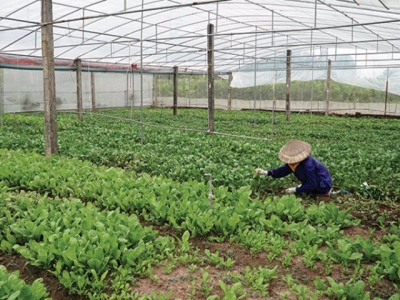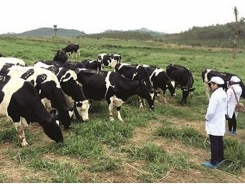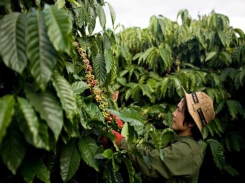Popularity of organics catching attention

Investment is coming from both local and foreign enterprises into organic farming and aquaculture as demand continues to exceed supply.
Jan’s organic processed food products, the only such Vietnamese brand, were again on display at the annual Organic Lifestyle Expo 2018 held in Japan in October and are familiar among Japanese consumers, having been exported to the country for a number of years. Mr. Dang The Giang, owner of Jan’s Co. and Fabulous Organic Farm, told VET that the company attends the expo in order to further introduce its organic products and seek more partners in what is a tough market. Japan is known to have potential for organic manufacturers and exporters like Jan’s, which after three years has built a successful brand in the country and won the trust of customers.
More interest, more investment
Vietnam ranks third in ASEAN and seventh in Asia in terms of organic farming and aquaculture areas, which increased from 12,120 ha in 2007 to 77,000 ha now and has 2,721 farmers doing organic farming, according to a 2018 report from international organics organization IFOAM.
Revenue in Vietnam’s organic market is estimated at VND3 trillion ($132.15 million) a year. “Demand for organic products is higher than supply in Vietnam, as local consumers have had greater concerns over food safety in recent years,” Associate Professor Dr. Le Van Hung from the Vietnam Organic Agricultural Association (VOAA) told VET. Given the demand, more investment has been flowing into the field from local and foreign enterprises. Though organic farming remains a new concept in Vietnam, some 300 enterprises of small and large scale are in the business, according to Dr. Hung.
With a passion for farming and for people’s health, Mr. Giang decided to study microbiological technology in depth about a decade ago to help farmers utilize available raw materials and not face higher costs for imported fertilizers, by creating a new type of non-chemical fertilizer. He then invested in organic farming and processed products in Da Lat, in the central highlands’ province of Lam Dong, in 2013, after spending much time learning what he could about farming.
From a 2-ha farm, Fabulous Organic Farm has grown to 5 ha and produces 30 types of fruit and vegetables, such as tomatoes, cucumbers, cauliflower, strawberries, asparagus, oranges, and bell peppers. He also developed Jan’s processed food, offering vegetables, spices, sauces, and jams. The farm has obtained four organic certifications, including from the USDA and the EU and Canada.
French vegetarian Ms. Ines Quoico came to Vietnam in 2012 and was concerned about how many chemicals she saw being used in fields, so began investing in organics by purchasing an organic farm from Dr. Nguyen Ba Hung, who was growing EU-certified organic vegetables. She is now the owner and Managing Director of the Organik Deli Fresh JSC and Organik Da Lat JVC.
In Duc Trong commune in Lam Dong, the 4.2-ha Organik Da Lat farm provides between 900 kg and 1.2 tons of organic vegetables certified under USDA, EU, JAS, and HACCP standards. “Demand is mainly from local retailers and consumers, as well as foreigners,” Ms. Quoico said. “Even though our flagship store is in Ho Chi Minh City, most of our revenue comes from Hanoi. We now sell less directly to consumers and more to supermarkets and grocery stores.”
Established in 2011, the Nico Nico Yasai Co., owned by Mr. Shiokawa Minoru from Japan, changed from traditional farming to non-chemical farming. He has expanded his farms from 2,000 sq m to 3.5 ha in Hanoi and the central highlands’ Dak Lak and northern Moc Chau provinces. The company provides six tons organic vegetables each month not only to Japanese expats but also to many Vietnamese consumers. “We used to only grow 300 kg a month, then I decided to use modern machinery and tools to raise productivity and meet the growing demand,” Mr. Minoru said.
Many suppliers are struggling to keep up with demand. Vinamilk’s organic dairy farm in Da Lat, with 500 heads, fails to do so and is working on increasing its number of farms in Da Lat and north-central Thanh Hoa province. The TH Group also plans to buy more cows for its organic milk production.
In addition to organic vegetables, a number of large local enterprises are now involved in organic aquaculture. The Minh Phu Seafood Group has exported organic shrimp to the EU, the US, and Canada for years. It has mangrove-shrimp zone certification for raising on 5,321 ha with 1,020 participating households organic shrimp of about 1,500 tons per year. “We continue to expand production and market scale,” said Mr. Duong Thanh Thoai, Assistant to the Group’s Chairman and CEO.
According Mr. David Gould, Senior Facilitator at IFOAM, investment in organics in Vietnam remains low but results have nonetheless been promising. “Support from VOAA has helped establish an important base of knowledge and services that can help the sector grow,” he said.
Greater prospects
Producing vegetables in Vietnam under international standards adopted by Japanese, US and European organic farmers is not an easy task, according to Ms. Quoico. Basic requirements include a pristine location with chemical-free soil, a water catchment system, because outside sources may be polluted, OMRI-registered fertilizer, which is costly because all is imported, and logistics, which can be costly for small concerns like hers. “I constantly need to upgrade infrastructure to conform with organic and food safety requirements and to optimize the yield, which affects the retail price and production cost,” she said. “Last but not least is cash flow, especially when distribution is more B2B than B2C.”
According to Mr. Gould, the main challenges for organic farming in Vietnam include training more farmers on how to produce organically and giving them access to the market through suitable guarantee methods, such as third-party certification, which is good for larger enterprises and for exports, and participatory guarantee systems, which are an excellent option for smallholders selling to markets in Vietnam. The guarantee systems should not pose unnecessary barriers to market entry. Shorter value chains bring more revenue to farmers, lower prices to farmers, and greater interdependence between them, he said.
Mr. Vo Minh Khai, CEO of the Vien Phu Organic & Healthy Foods JSC, said the greatest challenge is not technical issues, technologies, or markets, but existing policies for those wanting to invest in and develop organic farming, such as those relating to capital, planning, and land. Involved in organic farming since 1995, Vien Phu has invested VND160 billion ($6.8 million) in organic fields on 317 ha in U Minh commune in the Mekong Delta’s Ca Mau province. Good policies, Mr. Khai said, would drive the development of enterprises.
The government, having issued Decree No. 109 providing preferential terms for small enterprises, cooperatives, farms, and farming households engaged in organic agriculture, has bolstered its support for organic production and hopes to develop market demand, Mr. Gould added. While the Ministry of Agriculture and Rural Development’s original interest may have been more focused on export markets and higher export revenues, there is also a recognized need to develop the domestic market as well, for the benefit of Vietnamese consumers’ health and for the protection of the environment.
Related news
Tools

Phối trộn thức ăn chăn nuôi

Pha dung dịch thủy canh

Định mức cho tôm ăn

Phối trộn phân bón NPK

Xác định tỷ lệ tôm sống

Chuyển đổi đơn vị phân bón

Xác định công suất sục khí

Chuyển đổi đơn vị tôm

Tính diện tích nhà kính

Tính thể tích ao




 Instant coffee, instant results
Instant coffee, instant results  Agricultural sector seeks ways to improve productivity, quality
Agricultural sector seeks ways to improve productivity, quality